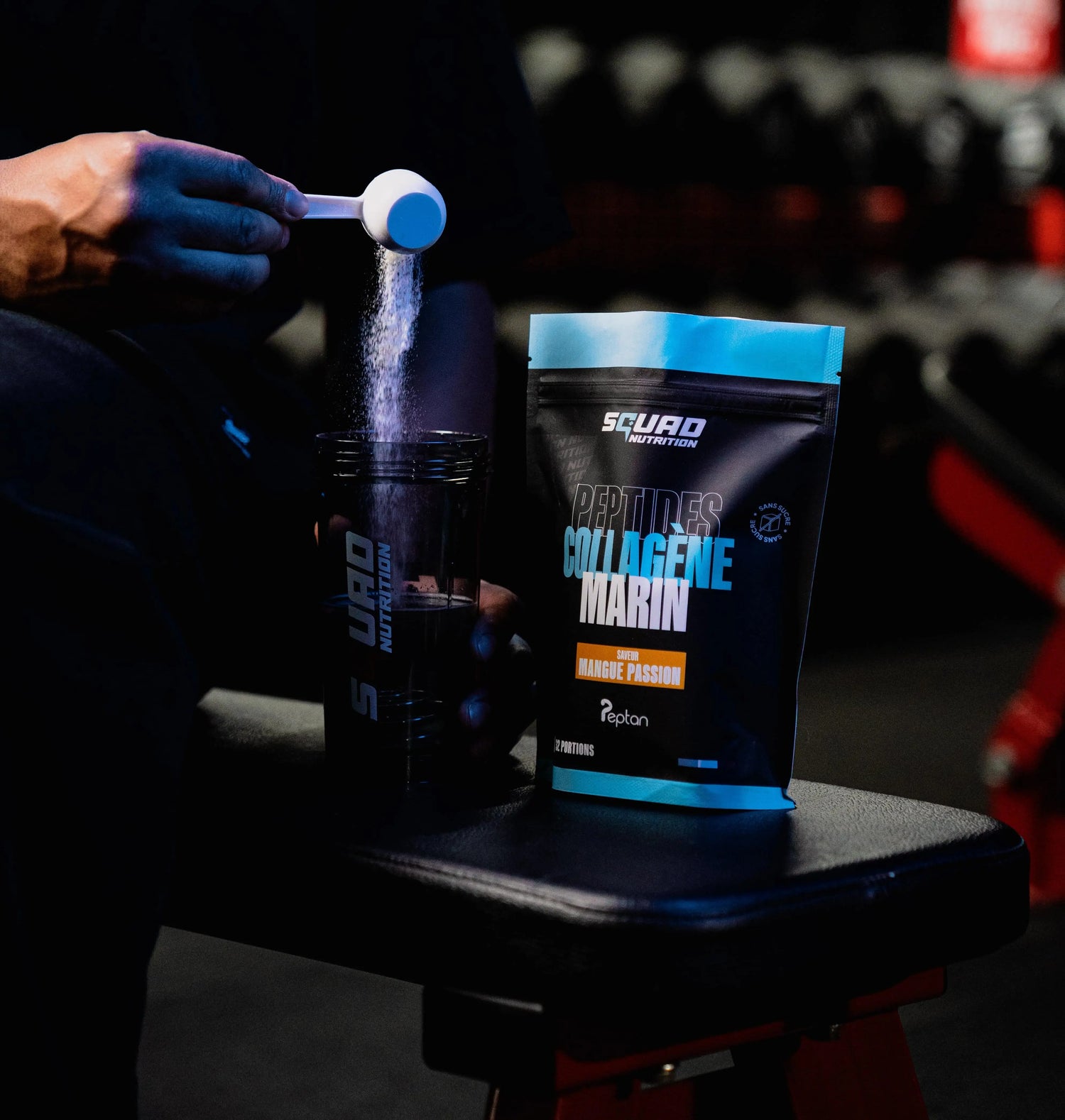
Marine collagen, its unsuspected benefits
In the world of dietary supplements, it's not always easy to navigate. With so many products promising the world, it can be a bit overwhelming: which supplement should you choose to improve your performance, health, or well-being? Marine collagen is one of those products everyone's talking about lately, but what do we really know about it, and why should we incorporate it into our routine? We're going to explore its unsuspected benefits, especially for athletes like you, and give you all the keys to understanding its role and how to use it effectively.
What is marine collagen?
Collagen is a natural protein found in large quantities in our bodies, playing a key role in the formation of connective tissues. It is particularly involved in the structure of cartilage, bones, tendons, skin, and even blood vessels. It contributes to their strength, elasticity, and tissue regeneration. To give you an idea, a collagen molecule is composed of approximately 1050 amino acids.
Collagen can come from various animal sources: bovine, avian, or marine. But it's marine collagen that particularly catches our attention here, as it offers a considerable advantage: its bioavailability is much higher than that of other types of collagen. In other words, your body can assimilate it much more easily. This collagen is extracted from the proteins contained in the skin of fish, such as salmon or cod, and its composition is strikingly similar to that of human collagen.
The benefits of marine collagen
Marine collagen is often associated with its rejuvenating properties, particularly for the skin. But its benefits aren't limited to this aesthetic aspect. In fact, marine collagen plays an essential role in the health of the entire body, from skin to joints, hair, and bones.
The benefits of marine collagen on the skin
This is probably one of the first benefits people talk about when discussing marine collagen: its impact on the skin. Collagen supplementation can improve skin elasticity and hydration, while boosting its firmness. As a natural antioxidant, it fights the signs of aging. It's no surprise, then, that marine collagen is often compared to a natural anti-aging or anti-wrinkle product. If you're looking to maintain supple and radiant skin, this supplement is a true ally. Personally, I've noticed a marked improvement in my skin's texture since incorporating it into my routine.
Several studies have shown that collagen promotes wound healing by aiding in the formation of new connective tissue. In the case of minor injuries or skin irritations, you can expect an accelerated healing process.
The benefits of marine collagen for hair
In addition to its effects on the skin, marine collagen is also beneficial for the health of your hair. It plays a key role in the production of keratin, the essential protein that makes up hair. By adding marine collagen to your diet, you'll help your hair become stronger, shinier, and healthier. Who hasn't dreamed of hair that glows with vitality?
Collagen also promotes hair growth by improving the health of hair follicles. If you tend to have brittle hair or experience hair loss, a daily supplement may be the ideal solution. Once again, my hair has gained thickness and shine thanks to this supplement.
The benefits of marine collagen on joints
Athletes of all levels are familiar with joint pain associated with physical exertion. Did you know that marine collagen can help maintain healthy, flexible joints? From the age of 25, our body's natural collagen production begins to decline. This is where supplementation becomes beneficial, especially if you engage in intense athletic activities.
Marine collagen can be particularly beneficial in relieving joint pain and preventing conditions like osteoarthritis. By taking marine collagen regularly, you can improve your mobility and flexibility, reducing the risk of injury. It's a supplement I've recommended to several athletes I know, and the results are clear: reduced pain and improved recovery.
The benefits of marine collagen on bones
Collagen makes up 90% of the organic structure of bones. Yes, you read that right: without collagen, your bones would be much more fragile. Regular supplementation with marine collagen can increase bone density and prevent fractures, while also helping to preserve your bone mass. For an athlete like you, this can make all the difference in maintaining optimal performance over the long term.
Who is marine collagen intended for?
Natural collagen production begins to decline from the age of 25, which is when it's recommended to start taking collagen supplements to support your body. But be careful, it's not just a matter of age: factors like smoking, eating too much sugar, or even stress can accelerate this decline. If you recognize yourself in any of these cases, marine collagen supplementation can really benefit you.
When and how to consume marine collagen?
To fully benefit from the benefits of marine collagen, it's recommended to incorporate it into your daily routine. A dose of 2,500 mg per day is ideal for keeping your joints, bones, skin, and hair in good shape. There's no specific time to take it; it's up to you to take it. You can take it in the morning on an empty stomach or in the evening before bed. Personally, I like to take it in the morning, mixed into a smoothie. Its mango and passion fruit flavor is very pleasant, and it's also Peptan® certified, which guarantees its effectiveness for your joints.

In short, marine collagen is much more than just a cosmetic supplement. It has multiple benefits for your body, from improving your skin to strengthening your hair, protecting your joints and supporting your bones. For athletes, it's a valuable ally for optimal recovery and injury prevention. From the age of 25, incorporating marine collagen into your routine could well be an investment in your long-term health and performance. Why not give it a try?
Faculté Sciences Économiques et Gestion
Bonjour et merci de nous partager cet article très instructif